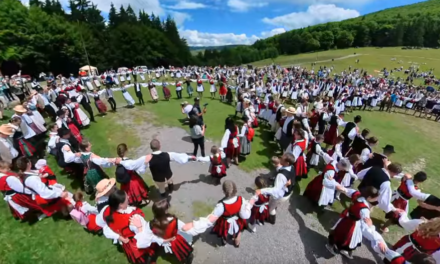In addition, their trust in institutions has also decreased.
The attitudes of Transylvanian Hungarians and Romanians regarding the Russo-Ukrainian war, their attitude towards refugees and immigrants, their intention to participate in the elections, their party options, and their trust in institutions were investigated by the Bálványos Institute in a public opinion poll.
Tibor Toró, teacher of the Sapientia EMTE and research director of the Bálványos Institute, and Tamás Kiss, researcher of the National Minority Research Institute, co-owner of the Transylvania Inquiry, presented the results of the research in Cluj on Tuesday morning, which revealed that Transylvanian Hungarians are more intolerant, anti-immigration and anti-Western in than the Romanian average, but at the same time their trust in the institutions also decreased.
Sociologist Tibor Toró said at the press conference that a telephone poll was conducted for the Hungarian population in February-March 2024, and for the Romanian population one month later, and the results were compared to a 2022 and a 2020 survey, which they also conducted. The 2022 research was taken up a few weeks after the outbreak of the Russian-Ukrainian war, and in it the relationship of the two nations to the war was examined.
As it turned out, in 2022, 74 percent of Romanians, 46 percent of Transylvanian Hungarians and 25 percent of Szeklerland residents said that Russia was the aggressor, while by 2024 this number had decreased everywhere, and the proportion of those who believed that
"Western countries and Ukraine provoked it by getting Ukraine too close to NATO".

Source: Maszol
Today, war has become normalized, society is more divided
As the research revealed, in the case of Transylvanian Hungarians, anti-Westernism and mainstream antipathy are transformed in geopolitical opinion. At the same time, there is also a division and uncertainty regarding the Romanians, there is no longer a majority of anti-Russian sentiment within the Romanian society.
"The division is increasingly appearing among the Romanians as well. When asked how much they agree with Ukraine joining NATO and the European Union, the answers show that a kind of pro-Russian and anti-Western position is formulated. Despite this, support for Ukraine's NATO and EU accession will increase by 2024, the reason for which may be that the war has now unfortunately become normalized, and until now it was feared that such a position would mean drifting into war.
explained Tamás Kiss.
He pointed out that the situation is clearly different for the Transylvanian Hungarians, the proportion of those who would support the accession is negligible, and this proportion decreased in 2024.
"In Romania, there is an absolute split as to whether the EU should help the Ukrainians, while the majority of Transylvanian Hungarians say that it should not"
he detailed.
He added that the research shows that the AUR is the Romanian party that is closest to the Hungarian voters in Transylvania in terms of their opinions and attitudes. He said that it also appears that AUR voters are no more anti-Hungarian than voters of other parties.
Ukrainian refugees in the crosshairs of welfare chauvinism
The researchers also drew attention to the fact that welfare chauvinism is a new phenomenon in Romania that appeared in connection with Ukrainian refugees, and that the attitude towards refugees changed a lot in 2024 compared to 2022.
"The research shows that Transylvanian Hungarians have always shown a more exclusionary and reclusive attitude towards refugees, but their opinion does not differ that much from the Romanian position either. What can be seen is that racism is not present among Romanians, they do not differentiate between nations, they judge everyone by the same standards, while in the case of Transylvanian Hungarians, there is a clear difference between white-skinned refugees of European origin and non-European, non-white-skinned refugees. "
- explained Tamás Kiss.
He added that the saddest figure for him is the one that shows that the Transylvanian Hungarian community is more intolerant of all minority groups than the Romanian community, and that this trend has increased by 2024. In the case of Romanians, tolerance has increased slightly, according to another research, the European Value Study, and the tolerance of Transylvanian Hungarians is very different compared to Romanian society.
Trust in institutions, willingness to make choices
Regarding the trust in institutions, Tibor Toró highlighted two interesting facts, firstly, that the trust of Transylvanian Hungarians decreased in almost all institutions, except in local governments, where trust increased. In the case of Transylvanian Hungarians, it is interesting that their trust in the EU decreases year by year, while in the case of Romanians there is stagnation.
"The decline is systematic in the case of Transylvanian Hungarians, after 2010 trust in the Union systematically decreases, while in the case of Romanians stagnation is typical"
he emphasized.
He added that since it is an election year, they also measured the desire and willingness of Transylvanian Hungarians to vote, and the research shows that the Hungarians' desire to vote is higher than that of Romanians, which can be attributed to the fact that RMDSZ has been campaigning intensively since autumn.
Featured Image: Facebook/bluedot.ro












